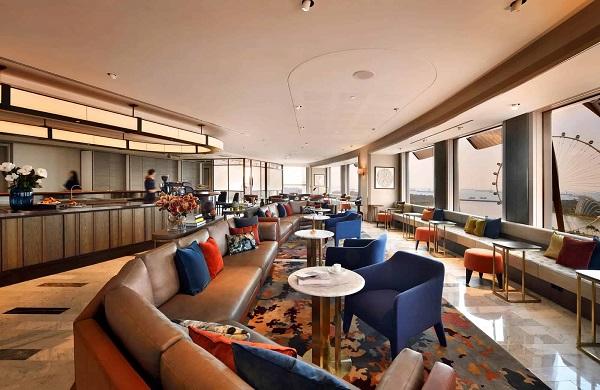
Here's how small coworking space operators can wrestle with global giants to survive
Seven operators control 63% of the city’s flexible market, with IWG holding 23.5% market share and WeWork and JustGroup nabbing roughly 12% each.
With only so much space to go around in land-starved Singapore, consolidation has been the name of the game in the city state’s rapidly maturing flexible workspace market as smaller players eager to join the co-working fray run the risk of getting eaten up by operators with global footholds.
The supply of flexible workspaces remain on the rise in Singapore as such set-ups nearly tripled from 1 million sq ft in 2015 to occupy roughly 2.7 million sq ft as of end-2017, data from Colliers show. Despite roughly 113 co-working spaces in operation in the CBD and accounting for 4.5% of the CBD Grade A office market, more supply is expected to come online in the near-term in response to heated demand from startups and multinationals alike.
“We would expect to see the supply continuing to grow as Singapore is still behind the expected levels of Flexible space in the market,” Duncan White, executive director, head of office services at Colliers International told Singapore Business Review. “[T]he flexible workspace footprint in Singapore could rise by 30-35% (or by about 670,000 sq ft) year-on-year for the whole of 2018 and a further 20% in 2019.”
Also read: Check out the largest co-working spaces in Singapore
Larger players with over 50 desks per location and a multi-location portfolio are best placed to ride this wave of growth, Colliers said in a report. This bodes well for seven operators who control around 63.1% of the local flexible workspace market as of end-June with a portfolio equivalent to the land area of 35 soccer fields.
IWG, which manages the Spaces and Regus brands, emerged as the undisputed leader in Singapore’s flexible workspace scene with 23.5% market share and an estimated portfolio size of 650,000 sq ft. New York-based WeWork which earlier acquired Spacemob in August 2017 to boost its regional presence trails behind the London-listed giant along with JustGroup who each hold around 12% and a portfolio over 330,000 sq ft.
On its part, The Great Room, which holds the distinction as the seventh largest Singapore operator with an estimated portfolio size of 76,000 sq ft, banks on its hospitality-level interior and ‘enterprise-level infrastructure’ to continue attracting member companies - regardless of size.
“Unlike many players in the flexible space-as-service category, The Great Room's ambition is to work with the world's most respected companies - whether they are Fortune 500 enterprises or 'Grown-ups' (start-ups that are taking flight) - and serve them better,” said Jaelle Ang, CEO of The Great Room. “Our ambition is to win gateway cities like Singapore, Bangkok, Hong Kong and Shanghai where many of our members, be it in financial services or technology, want to be at.”
Given their large scale on offer, White suggests that MNCs and Enterprise Model occupiers may increasingly turn to global operators, giving them all the more reason to snap up the remaining 110 small to mid-sized operators in an effort to sustain their growth.
“By consolidating, co-working operators are able to reap economies of scale,” said Constance Leung, director of consulting at Edmund Tie & Company (ET& Co). “One of the unique selling points of co-working spaces is the network that these operators offer. Members prefer a larger network for convenience and networking opportunities.”
Also read: Singapore landlords tap into flexible workspace boom
Against the city’s limited land supply, White estimates that the ideal percentage of co-working space on offer in the market could be around 6-7%. However, the saturation is noticeably more evident in some areas than most.
Colliers notes that the most saturated segment are single-location operators that are managing spaces below 2,000 sq ft and catering largely to small businesses and freelancers. Such small size tames in comparison against the steadily expanding average location size leased by flexible workspace operators which have been growing since 2015.
In three years, the average size of flexible workspace leases from 11,800 sq ft in 2015 more than doubled to 26,600 sq ft in 2018 YTD in response to the booming needs of multinational corporations which typically require hundreds of desks.
New players into the scene, like CoCRE8 which just entered the Orchard Road market in H1 2018, acknowledge the uphill battle against larger operators as they recognise that their limited product selections could be challenging for members seeking to enjoy the flexibility and convenience of travelling between different outlets - an offering that larger players can easily provide.
“With m[an]y big players and established brands, we definitely need to put in more effort in creating awareness within the industry,” Wei Ling Tan, business development manager of CoCRE8 which has a 6,200 sq ft lease at International Building.
However, smaller players are not letting up without a fight as they bank on their differentiated offerings to lure footfall. “With a smaller scale of set up and clients, we are able to customise our services to fit our clients,” said Tan, adding that since its business portfolio owns the hotel next door, Yotel, members and their visitors can get to enjoy preferential rates in addition to support from building management as landlord and developer of the building.
Small- and mid-sized operators could also merge to create scale that could level the playing field. They could also spend resources on differentiating themselves by offering unique concepts and focus on niche clientele like MOX which focuses on the creative community, added ET& Co’s Leung.
“We have always believed that there is a viable position in the market for the smaller or local operators, however they need to focus on the smaller start-up environments, and consider looking at niche offerings, whether in terms of industry or something softer such as working environment, personality and specific offerings that differ to the larger players,” echoed White.
Photo from The Great Room
























 Advertise
Advertise









